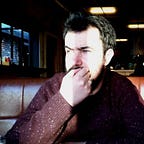Inherent Vice review
Originally published on Hopscotch Friday in February 2015
“If the mystery novel is at all realistic (which it very seldom is) it is written in a certain spirit of detachment; otherwise nobody but a psychopath would want to write it or read it.” Raymond Chandler The Simple Art of Murder
“Hey you/
You’re losing, you’re losing, you’re losing, you’re losing your vitamin C/”
- Can, Vitamin C
Paul Thomas Anderson’s The Master was big and vast, symbolically opening on a shot of the ocean to suggest the thematic excesses of the plot. Inherent Vice opens with a narrow alley between two huts along Gordita Beach in 1970.
Anderson has exchanged an overarching discussion of freedom and meaning in The Master, for a smokily intimate study of Doc Sportello (Phoenix again) and his attempt to understand what is happening on a moment to moment basis.
When ex-lover Shasta (Katherine Waterston — luminous) walks in to his living room one night and drops a shady plot to lock property developer Mickey Wolfmann (Eric Roberts) in a mental home, Doc’s first reaction is to resignedly rub his eyes. Then he gets a beer. Then he asks Shasta how the conspiracy makes her feel.
Doc is an unlikely PI — cheekily operating out of a borrowed doctor’s office, existing in a constant narcotic haze, free associating clues and impressions of the cases that drip down to him from California’s freak community. He also has a reputation for being a man who ‘does good’, an unlikely moral guardian for the lost and drug-ravaged refugees of the sixties.
The Wolfmann case quickly becomes more complex, with the developer and then Shasta herself vanishing, and Doc becoming implicated in a murder pinned on him by hippie-hating ‘Big Foot’ Bjornsen (Josh Brolin).
Doc then stumbles across a seemingly connected conspiracy concerning ‘The Golden Fang’, which is either a boat, or a foreign drugs gang, or a consortium of dentists. Given that this is a Pynchon story, it could also be simultaneously all three.
Needless to say Doc is very confused by all this — but then so is everyone else, so much so that paranoia is almost a unit of currency between the weird cast of characters that amble onscreen.
The film captures the langourous yet thoughtful flow of language from Thomas Pynchon’s novel perfectly. Perhaps the best innovation is Anderson’s conceit of having Sortilège (Joanna Newsom), a friend of Doc’s act as narrator for the story — appearing and disappearing in scenes. Is she real, or a quirky ghost? Newsom’s softly voiced delivery of rambling asides on astrology, or psychic impressions nail the Pynchonian theme of an alternative perspective on the world being strangled in the crib.
Largely this is what Inherent Vice is about, the last gasp of sixties idealism. Doc persistence in the face of police brutality and threats to his life from neo-nazi thugs, is grounded in a simple sense of compassion. He is neither mercenary nor righteous, he just tries to ‘do right’.
Meanwhile the hippies find themselves hoodwinked and corrupted by government spooks, revolutionaries find themselves in bed with fascists, and ‘straight society’ is running scared from the memory of Charles Manson. Doc finds himself sitting opposite a murderous thug who listlessly mutters ‘groovy….psychedelic’ while on the phone, suggesting the long-hair idiom has been completely assimilated by “the ancient forces of greed and fear”.
The scattershot-paranoia of Inherent Vice points to the greater fear that instead of a vast conspiracy underpinning everything — no one is in charge, but everyone suspects they are being controlled somehow.
Anderson’s cast thrive on bringing these colourful characters to live. Brolin’s Bigfoot is a granite-faced monster, so close to becoming sympatico with Doc, but repressing any sense of brotherly love (resulting in a funny sight gag in volving a chocolate banana). Owen Wilson is a COINTELPRO stooge who joined up to escape drug addiction and instead found himself more trapped than ever. Jena Malone delivers a meet-cute story that heavily involves a sickening amount of bodily fluids, but in such a sweet way it is almost romantic! Martin Short appears as the cartoonish dentist Dr Rudy Blatnoyd.
But it is Katherine Waterston’s Shasta who delivers the most devastating performance, underlining the tragedy of how the lost innocents of the sixties discovered they wanted to be dominated by ‘The Man’. That they even came to like it.
Easily placed somewhere on the spectrum between Altman’s The Long Goodbye and the listless B-movies from the same era, Inherent Vice is bittersweet, funny, playful and an incredibly on-point translation of Pynchon’s literary themes to film.
